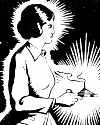|
By working at times for 20 hours at a stretch, Florence Nightingale and her nurses brought order out of chaos. First came cleanliness, a novel thing in those days before Lister's antiseptics and Pasteur's germ theory. One of her first orders was for 200 scrub brushes to clean the floors. Then came a laundry and a hospital kitchen - a kitchen that could supply the right kind of food for the patients. And when her supplies began to run low, she proceeded to cut the red tape to get more. In less than six months, she had set up an entirely new system and established a storehouse to receive and distribute supplies. The death rate fell in less than six months after her coming from 420 in a thousand to less than twenty-two, a reduction of almost 95%.  But her greatest contribution was in the role of ministering angel.
Long after the hospital had settled down for the night, the Lady of the
Lamp could be seen making her solitary rounds through the endless
rows of wounded - a smile here, a word of comfort there, or a cool
hand on a fevered brow. To the soldiers she was an angel, she
called them "her children" and would spend hours writing messages back
home to their relatives and loved ones. This was the beginning of the
spirit of the Red Cross.
But her greatest contribution was in the role of ministering angel.
Long after the hospital had settled down for the night, the Lady of the
Lamp could be seen making her solitary rounds through the endless
rows of wounded - a smile here, a word of comfort there, or a cool
hand on a fevered brow. To the soldiers she was an angel, she
called them "her children" and would spend hours writing messages back
home to their relatives and loved ones. This was the beginning of the
spirit of the Red Cross. |








